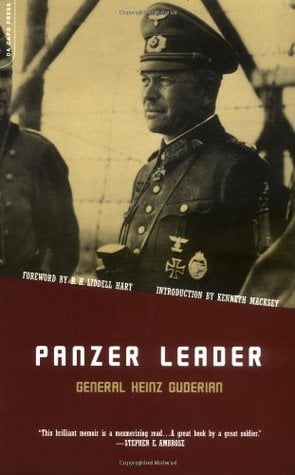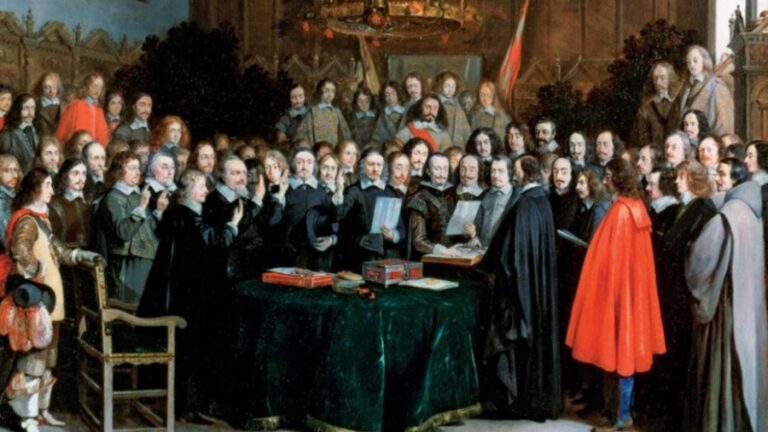General Heinz Guderian on Hitler and Leadership
I first read the memoirs of General Heinz Guderian, Germany’s foremost tank commander during the Second World War, while I was still in high school.
I have to say that Guderian’s whole deportment immediately appealed to me. Here was a man of great dynamism, loyalty, and innovation; one who understood service and command, and who showed persistence in promoting tank warfare in the military’s inevitable internal bureaucratic struggles and great boldness in the rough-and-tumble of war itself.
Guderian’s memoirs are decidedly stoic, detached in the face of the many tragedies and otherwise almost cheerful. The sober French and original German titles reflect this: “Memories of a Soldiers,” Souvenirs d’un Soldat, Erinnerungen eines Soldaten. Here was a real Prussian. With his steely eyes and neat mustache, Guderian looked rather like my young grandfather during the same war, albeit they wore different uniforms and fought on opposing sides.
There is not an ounce of bitterness despite the total defeat of his country, right up the territorial loss and ethnic cleansing of millions of Germans in his ancestral East Prussia. On the contrary, Guderian always expresses his gratitude to family, mentors, and colleagues who helped him along the way. In a philosophical mood, Guderian will occasionally quote Hamlet on the vanity of things.
The English edition of Guderian’s memoirs emphasizes his role as a tank commander with the evocative title Panzer Leader. Indeed, Guderian promoted tanks in Germany, much as Charles de Gaulle did in France, as the decisive form of modern warfare, combining concentrated power and speed which would enable, after initial breakthroughs, huge sweeps and conquests before an enemy had time to react. Guderian would put his theories into practice, with stunning results, in Poland, France, and the initial invasion of the Soviet Union.
But while De Gaulle fruitlessly lobbied the politicians of the Third Republic for years on end – who feared a professional military, clung to old tactics, and the hugely expensive defensive Maginot Line – Guderian found that Hitler was quite receptive to his ideas.
Guderian’s memoirs go into meticulous detail on his interwar years and especially the various campaigns of the war itself. This can be a bit of a slog if one isn’t a military history buff and, anyway, memoirs a rather treacherous genre for which one needs to be able to cross-reference with other sources to guard against the selective and misleading nature of human memory.
The book concludes with two synthetic final chapters on “The Leading Personalities of the Third Reich” and “The German General Staff,” which provide great insight and are broadly congruent with what we find elsewhere.
Hitler’s Personality and Leadership
Guderian provides a brief and in many ways familiar account of Hitler’s appeal in ruined interwar Germany. Against the injustices of the Treaty of Versailles (most notably, military castration and prevention of self-determination in Austria and the Sudetenland by which ethnic Germans naturally would have joined Germany proper) and the impotence and division of the Weimar Republic, Hitler proposed a nationalist dictatorship which would “abolish unemployment and party strife.” Guderian says these aims “were entirely desirable and with which any good German must agree.” After listing the innumerable despots and demagogues which have seduced countless peoples, he adds that “the Germans cannot rightly be accused of being any more suggestible than other nations” (433).
Writing in 1951, Guderian notes in passing that the Austrian Question was lay still unresolved in the postwar world, as Austria “cannot exist without coordination with some larger industrial area; now it is to be hoped that a European economic union will solve this problem” (433).
Guderian provides a succinct character portrait of Hitler, hiding neither his appreciation for his qualities nor his severe criticism:
Of humble origin, limited schooling, and with insufficient training in the home, coarse in speech and in manner, he stands before us as a man of the people who was most at ease among an intimate group from his own part of the country. To begin with, he did not feel awkward in the company of persons of a higher cultural background, particularly when the conversation dealt with art or music or similar matters. Later on, certain elements of his closest entourage, persons themselves of low culture, deliberately awakened in him a strong dislike for those people of a more spiritual nature and with a socially superior background with whom he had previously been able to get on . . .
He had an unusually clever brain and was equipped with remarkable powers of memory, particularly for historical data, technical figures, and economic statistics; he read everything that was put before him and thus filled in the gaps in his education. He was continually amazing people by his ability to quote relevant passages from what he had read or had heard at conferences. “Six weeks ago you said something quite different,” was a favorite and much-dreaded remark of the man who became Chancellor and Supreme Commander of the Armed Forces. And there was no arguing with him about this, for he would have the stenographer’s record of the conversation in question immediately available.
He possessed a talent for casting his ideas into an easily assimilated form, which he would then hammer into his listeners’ minds by means of endless repetition. . . .
He possessed natural oratorical talents of an unusually high order . . . He understood brilliantly how to adjust his manner of speech according to whether he was addressing industrialists or soldiers, devout Party comrades or skeptics, Gauleiters, or minor functionaries.
His most outstanding quality was his willpower. By the exercise of his will he compelled men to follow him. This power of his worked by means of suggestion and, indeed, its effect on many men was almost hypnotic. (430-1)
Hitler was brought down by “his habit of underestimating other races and nations” and his murderous racial policies in the East: “If any single fact played a predominant part in the collapse of National Socialism and of Germany, it was the folly of this racial policy” (440-1).
According to Guderian, Hitler was too bold in starting conflicts (such as the declaration of war against America) and too timid in finishing them off (he laments the armistice with France, which prevented action against Suez and Gibraltar which might have brought Britain to heel).
Guderian outlines Hitler’s isolation and decline as defeat became inevitable:
What sort of man was [Hitler]? He was a vegetarian, a teetotaler, and a non-smoker. These were, taken independently, very admirable qualities which derived from his personal convictions and from his ascetic way of life. But, connected with this, was his isolation as a human being. He had no real friends. His oldest Party comrades were, it is true, disciples, but they could hardly be described as friends. So far as I could see there was nobody who was really close to him. There was nobody in whom he would really confide his deepest feelings. There was nobody with whom he could talk freely and openly. As he never found a true friend, so he was denied the ability deeply to love a woman. He remained unmarried. He had no children. Everything on this Earth that casts a glow of warmth over our life as mortals, friendship with fine men, the pure love for a wife, affection for one’s own children, all this was and remained for ever unknown to him. His path through the world was a solitary one and he followed it alone, with only his gigantic plans for company. His relationship with Eva Braun may by cited as a contradiction of what I have here written. I can only say that I knew nothing of this and that so far as I am aware I never once saw Eva Braun, though for months on end I was with Hitler and his entourage almost every day. It was obvious that this woman cannot have had any influence over Hitler, and the more’s the pity, for it could only have been a softening one.
Such was Germany’s dictator, a man lacking the wisdom and moderation of his great examples, Frederick the Great and Bismarck, a man going in solitary haste from success to success and then pressing on from failure to failure, his head full of his stupendous plans, clinging ever more frantically to the last vanishing prospects of victory, identifying himself ever more with his country. (441-2)
Hitler’s daily life hygiene was awful, holding late-night conferences, chatting with his secretaries until dawn, then waking up after a few hours’ sleep. This routine apparently worked up to Stalingrad, then he began to fall apart both physically and mentally. After the July 1944 assassination attempt, the whole left side of his body would shake:
His mind, it is true, remained active; but this very activity itself was unhealthy, since its mainsprings were his distrust of humanity and his anxiety to conceal his physical, spiritual, political, and military bankruptcy. Thus he attempted continually to deceive both himself and others in his effort to keep his edifice standing, for he really knew what was the true state of himself as well as of his cause. (443)
By the end, Guderian laments, “the demon conquered the genius.”
Guderian also provides little sketches of other Third Reich leaders, such as “the most impenetrable” Himmler, a polite, austere, and “inconspicuous man with all the marks of racial inferiority” (446).
On Leadership
Guderian also comments at length on leadership in his chapter on the General Staff, the body at the head of the Prussian and later German militaries, in charge of systematically studying war and drawing up mobilization and campaign plans.
Guderian says of Carl von Clausewitz’s classic On War:
This little-read but much-criticized book contains the first attempt to create a philosophy of war and to analyze its characteristics from a detached standpoint. It played a great part in forming the attitude of mind of several generations of German General Staff Corps officers. From it derives that striving to observe both men and affairs coolly and sensibly which has been the foremost quality of all outstanding members of the German General Staff. It served also to strengthen the patriotism and the idealism which inspired such officers. (454)
Indeed, On War is a remarkable and in some ways prophetic book on the essence of war, which especially in a mass/modern technological context tends to lead to radicalization towards extremes. The book is a long and sober meditation on a fundamental subject by a great mind, somewhat akin to Alexis de Tocqueville’s Democracy in America.
Retracing the actual influence of On War in Germany is a difficult enterprise. However, it is true that Clausewitz was celebrated as a great hero in the Third Reich and Hitler held up the great Prussian officer’s name as kind of totemic incantation to rally his followers to fight on.
Guderian remarks Clausewitz’s life was a humble one:
Clausewitz was never privileged to hold high office in wartime. He wrote On War. He was the type of quiet, retiring, scholarly man, often to be found in the German General Staff Corps. Little known during his lifetime, he was to exercise a great influence on future generations. (456)
Guderian cites General Staff chief Alfred von Schlieffen’s dictum: “Great achievements, small display: more reality than appearance.” (454) He goes on:
An ideal General Staff Corps officer might be described as possessing the following qualities: sincerity, of conviction, cleverness, modesty, self-effacement in favor of the common cause, and strong personal convictions combined with the ability tactfully to present these convictions to his commanding general. If his opinions were not accepted he must be sufficiently master of himself to loyally carry out his commander’s decisions and to act at all times in accordance with his wishes. He must fully understand and feel for the needs of the troops and he must be inexhaustible in his efforts to help them. (459)
Inevitably, historians have alleged that Guderian’s memoirs are misleading in several respects. He was hardly alone in promoting tank warfare in Germany and the Wehrmacht was not wholly separate from the exterminationist enterprises of the Eastern Front, such as the summary execution of all captured communist political commissars.
Myself, I could not help admiring Guderian’s attitude as a teenager. I even had the rather hair-brained idea of lending his memoirs to my grandmother, as if to say: “You see, the Germans weren’t all bad.” She eventually returned the book without comment.
Guderian represented the Prussian officer corps and an ethos that struck me as precious and admirable. I thought that Prussia’s was a unique tradition of manly service which Hitler’s titanic ambitions had misused, abused, and ultimately destroyed. In particular, the stated ambition of smothering Poland, a great European nation, out of existence struck me as self-evidently unjust, to not speak of the massacres of Eastern Jewry and the deportation of Western Jews in such conditions that these could only die en masse. After one blow too many, the sword of Germany had been shattered against the rocks.
And I feel I should give Guderian the last word:
At a difficult time a prince of my royal family once sent me a small portrait of Frederick the Great on which he had inscribed these words that the great king addressed to his friend, the Marquis d’Argens, when his own defeat seemed imminent. “Nothing can alter my inner soul: I shall pursue my own straight course and shall do what I believe to be right and honorable.” The little picture I have lost, but the king’s words remain engraved on my memory and are for me a model. If, despite everything, I could not prevent the defeat of my country, I must ask my readers to believe that this was not for lack of a will to do so.
This book is intended as a token of gratitude to the dead and to my old soldiers, and as a monument to preserve their fame from oblivion. (446)
Notes
For example, Guderian claims that “The Polish Pomeranian Cavalry Brigade, in ignorance of the nature of our tanks, had charged them with swords and lances and had suffered tremendous losses” (72). However, historians claim that this is a myth – developed by the Germans and then taken on by the Poles themselves as a gallant sacrifice – and that the cavalry had in fact charged German infantry in a costly but ultimately successful delaying action.
By Guillaume Durocher
Source: Unz Review







